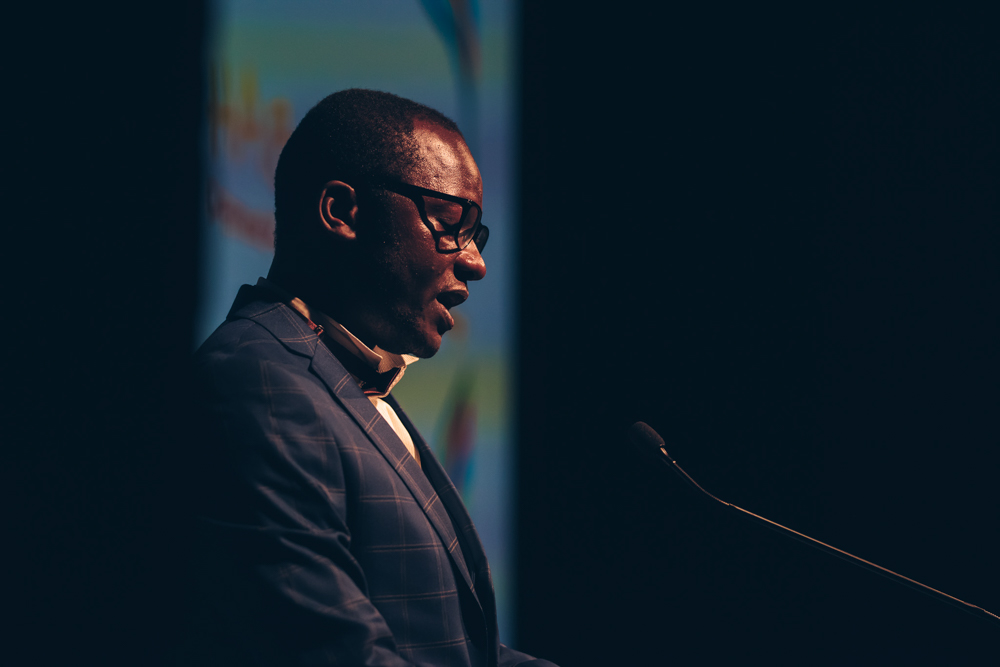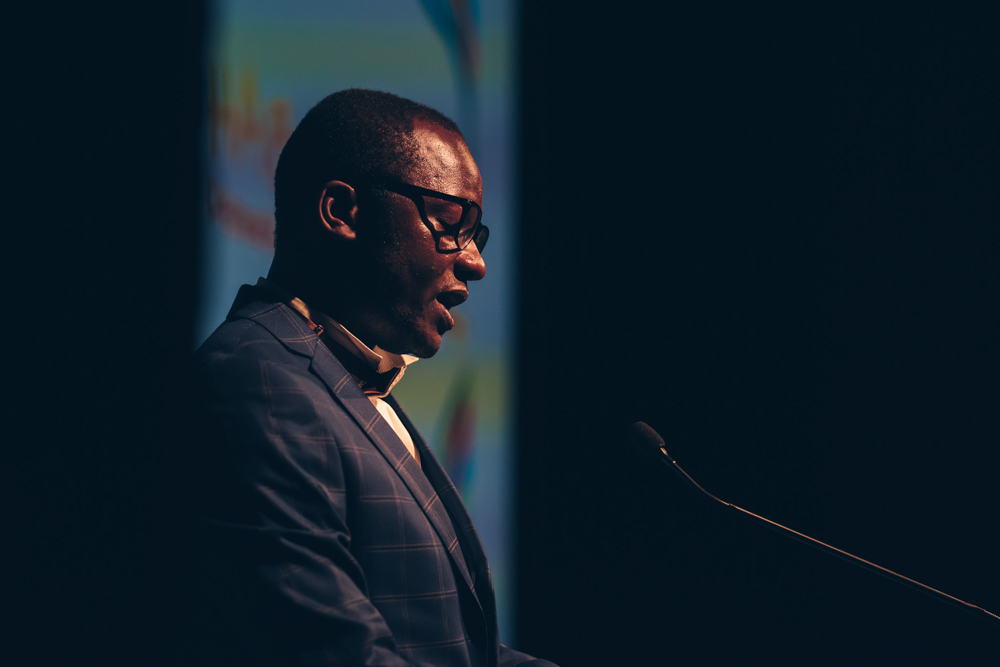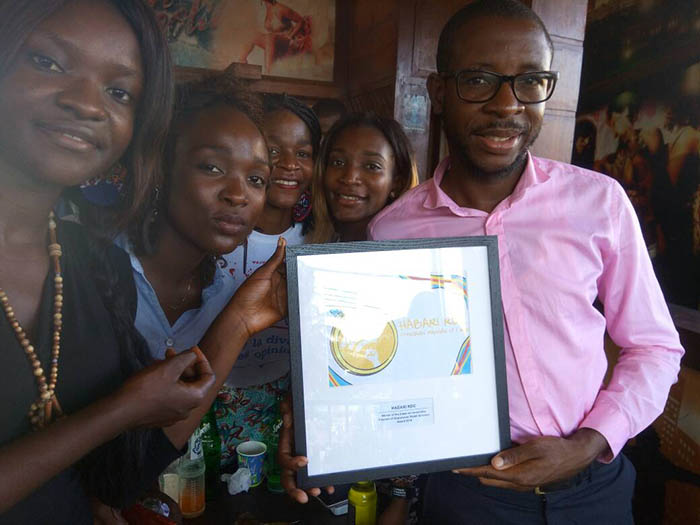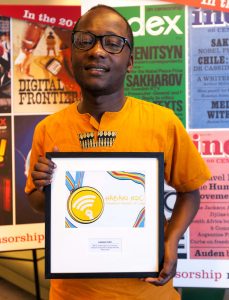Index relies entirely on the support of donors and readers to do its work.
Help us keep amplifying censored voices today.
[vc_row][vc_column][vc_column_text]

Guy Muyembe of the Digital Activism Award-winning Habari RDC at the 2018 Index on Censorship Freedom of Expression Awards (Photo: Elina Kansikas)
In December 2018, when Index on Censorship last spoke to Habari RDC, the 2018 Index on Censorship Freedom of Expression Award Fellow for Digital Activism, the Democratic Republic of Congo was gearing up for an election that would name a successor to president Joseph Kabila, who had been in power since 2001.
The election, which took place on 30 December 2018, led to much confusion over who has won and the Regulator of Media for Congo forbid the press from publishing provisional results of the election. However, exit polls inevitably began circulating following the vote, causing various candidates and their supporters to claim the win.
“Alliances between political parties are in the process of being reorganised and we do not really know who the opposition is and who is in power,” Guy Muyembe, president of Habari RDC, told Index. “We will probably have until the end of the year to know the identity of each other.”
On the day after the election, authorities in Congo shut down the internet and disrupted SMS services under the guise of tackling fake news. Social media companies were blocked, and Habari RDC’s internet service provider, DHI Telecom, made clear that they had cut Habaris’ connection because their content was deemed to be dangerous.
The shutdown ended on 19 January 2019 and cost the country and its people millions of dollars in revenue.
Although Habari, like many in the Congo, was greatly impacted by the internet shutdown, they had measures in place to ensure they could operate in some capacity. “We have always made sure that our work is not 100% dependent on the internet connection. There are several offline activities where young people from lower-income neighbourhoods take part,” Muyembe said.
When elections are surrounded by doubt, it can be difficult to sift through all of the information and find the facts. Habari makes it a priority to always ensure what they publish is relevant and true.
“We avoid jumping on everything that is published here and there on social networks. Our luck is that we are not a news media outlet,” said Muyembe. “So we take our time to analyse and verify that the information in our possession is accurate.”
Launched in 2016, Habari is a collective of more than 100 young Congolese bloggers and web activists who give voice to the opinions of young people from all over the country. As a group of young Congolese bloggers working in a country where the majority of the population is also young, their work often focuses on issues concerning and relevant to the Congolese youth.
“Reports from various organisations show that more than half of the population is under 30 years of age. So we have to consider them if we want development tomorrow,” said Muyembe.
This year is a busy one for Habari as they work to ensure that youth issues and concerns are both heard and addressed by policymakers in the DRC.
“Habari will organise two programmes each year in partnership with organisations like the I’Institut Français: Facing young people — a moment of exchange between the authorities and young people on issues of general interest; and CaféBlog — a workshop of exchange and training on issues related to the use of the internet and social networks,” said Habari.
As for the future of the Congo, despite a rocky beginning to the year, Habari is hopeful that change is taking place, which will allow for greater freedom of expression in the future.
Muyembe points out that there are things being done now that were not seen during Kabila’s time as president or pre-Kabila. For example, the public radio and television channels now occasionally broadcast activities of those who are not favourable to those in power.
“We must do everything possible so that Congolese society becomes more democratic and allows several contradictory voices to express themselves,” said Muyembe.
Habari has benefited greatly from their position as Index fellows, Muyembe added, as they’ve grown from a locally known organisation to an internationally recognised organisation. They will work with Protection International for a training session in order to help improve the security issues for their bloggers.
As a result of Habari RDC working with Index, “it was easier for it to fit into the landscape of Congolese organisations both in the youth sector and online media. Secondly, it allowed us to network with organisations from other countries to meet future challenges,” said Muyembe.[/vc_column_text][/vc_column][/vc_row][vc_row][vc_column][vc_basic_grid post_type=”post” max_items=”4″ element_width=”6″ grid_id=”vc_gid:1554715549345-45e11f03-8d2c-7″ taxonomies=”10735″][/vc_column][/vc_row]
[vc_row][vc_column][vc_column_text]

Guy Muyembe of the Digital Activism Award-winning Habari RDC at the 2018 Index on Censorship Freedom of Expression Awards (Photo: Elina Kansikas for Index on Censorship)
The Democratic Republic of Congo will go to the polls on 23 December to elect a successor to incumbent president Joseph Kabila, who has been in power since January 2001 when he inherited the position from his assassinated father. The election was originally scheduled for 27 November 2016, a delay that has caused many problems for the country.
“The only thing that is certain about the election is the uncertainty that comes with it,” Guy Muyembe, president of Habari RDC, the Index on Censorship Freedom of Expression Award Fellow for Digital Activism, tells Index. “Will it take place, will it not take place? How transparent will it be? In all likelihood, not very. And will the result tear the country apart?”
Launched in 2016, Habari RDC is a collective of more than 100 young Congolese bloggers and web activists who give voice to the opinions of young people from all over the Democratic Republic of Congo. In recent months, they have been working towards covering what could be the first democratic transfer of power in the country’s history.
“But in the end, it will most likely be the same people in power,” Muyembe says. “As for Kabila himself, if he remains in the country, he might be operating from the shadows. This is definitely not a reassuring prospect.”
This is a tense time for the DRC. The UN high commissioner for human rights Michelle Bachelet has expressed concern at violence against opposition rallies around the country in the run-up to the election. Bachelet called on the authorities to ensure “the rights to freedom of expression and peaceful assembly – essential conditions for credible elections – are fully protected”. Muyembe is also concerned about what all this means for those running in opposition to the ruling People’s Party for Reconstruction and Democracy: “They’re taking part in the campaign, but will they actually take part in the election in the end?”
During this period the risk factor for activists has been very high, Muyembe says. “They’re not protected legally, and it’s very easy to label them spies or start a crackdown against them.” The prospects for a free press in the country don’t look any better. Peter Tiani, a journalist for Le Vrai Journal, was arrested in November and faces a one-year jail term on defamation charges for reporting that a large sum of money was stolen from the home of Bruno Tshibala, the country’s prime minister. Tiani became a target because he reported on the second most powerful man in the DRC, Muyembe says.
“Even journalists who don’t explicitly view the government in a favourable way — those who aren’t necessarily negative but are neutral, as many are — are presented unfavourably by state media,” Muyembe explains. For those who are explicitly critical, he says, the situation can get even worse. With this in mind, Habari has put together some helpful advice for bloggers and citizen journalists.
Online freedoms too remain under strain in the absence of clear laws on the internet, Muyembe says. “While we do want to see such a law, we are also nervous because it could go in a very bad direction and is open to abuse.” As Habari has reported, the hacking of websites ahead of the election has facilitated both censorship and fake news.
Young Congolese people were at the forefront of calls for Kabila not to seek re-election, and Muyembe and his colleagues are keen to ensure that the voices of the country’s youth continue to be heard. Habari took part in Speak, a worldwide campaign organised by the NGO Civicus, in November, which sought to raise awareness and build global solidarity in an era when people around the world are facing increased attacks on their basic freedoms. Habari hosted the Gala of Peace, a meeting between young supporters of different political parties and members of citizen movements, that included theatre and dance as well as discussion.
“This year, the idea was to try to work on uniting people who’ve been divided, whether it’s on the social level or the political level,” Muyembe says. “This has much relevance in the DRC, for the divisions that exist between those people who are pro and anti-regime, between the old and young, between men and women and those of different tribes.”
The DRC is also right now in the middle of one of the worst Ebola outbreaks in its history, exacerbated by the ongoing unrest, making it impossible to transport adequate medical care to those in need. “This crisis is different this time around because it’s happening in a part of the country which has been severely affected by the war — the Kivu province in the east of the country,” Muyembe says. “Because of the war, there is a mass migration of the population there whenever there is an attack, which could turn into a major Ebola crisis as there’s a lot of people moving around.”

Next year will be a busy one for Habari in continuing to cover all of these issues. Going forward, the organisation’s biggest challenge, Muyembe says, is ensuring the project has a future as Habari’s partnership with RNW Media, a Dutch organisation that helps young people make social change, along with the essential funding from this relationship, ends in 2020.
However, becoming an Index on Censorship Fellow offers much hope, Muyembe says. “The award has increased how well-known the project is, and how serious it appears. If we now go to meet someone in Kinshasa to talk about the project, or go to an embassy to try to organise something, we are better received.”
For Habari, the training provided by Index, such as the virtual sessions on reporting on elections, has also been invaluable, Muyembe adds. The next training session, by Protection International in January, will focus on developing security and protection management strategies.
Muyembe says that people are often suspicious of organisations involving young people, but the Index award has made things a little easier in this regard. “Every day, colleagues have been telling me that they need to have a copy of the prize that they receive on their website,” he says. “It’s like a business card.”
[/vc_column_text][/vc_column][/vc_row][vc_row][vc_column][vc_basic_grid post_type=”post” max_items=”4″ element_width=”6″ grid_id=”vc_gid:1545229521275-5925950b-9a87-2″ taxonomies=”16143″][/vc_column][/vc_row]
[vc_row][vc_column][vc_video link=”https://youtu.be/mCmRy7htLos”][vc_column_text]

Congolese digital activist Guy Muyembe of 2018 Freedom of Expression Digital Activism Award-winning Habari RDC (Photo: Index on Censorship)
Launched in 2016, Habari RDC is a collective of more than 100 young Congolese bloggers and web activists, who use Facebook, Twitter and YouTube to give voice to the opinions of young people from all over the Democratic Republic of Congo. Their site posts stories and cartoons about politics, but it also covers football, the arts and subjects such as domestic violence, child exploitation, the female orgasm and sexual harassment at work. Habari RDC offers a distinctive collection of funny, angry and modern Congolese voices, who are demanding to be heard.
In the early 2000s a young teenager wanted to share what he thought of Congolese society. It was so important to him. He had so much to say. He, the boy who grew up in the mining region of Katanga in the south-east of the Democratic Republic of Congo, wanted only one thing: to finally speak.
The Democratic Republic of Congo is almost 10 times the size of the United Kingdom. One of the European explorers described this immense territory as a geological scandal. Little did he know how accurate he was being. This country is a scandal. In a country that supplies minerals needed to make your smartphones more than two million of its children are victims of malnutrition and its young people are idled by massive unemployment.
In the mid-2000s, I discovered the internet and its applications like blogs and social networks. It was great. I immediately realised the power of this tool. Finally, I had in my hands a means of allowing me to denounce these scandals.
In a country like mine, there are multiple polarisations, and at all scales of power. The Guardian, last year mentioned the transition to the era of the post-truth, people no longer believe the facts. In the DRC, we have been pioneers in this area. The spread of the rumour was there before social networks, it has only grown since.
It is in this context that Habari, our organisation was formed around 100 bloggers distributed around the country. We are a team of editors who verify the facts that we rely on. We may not always agree because we have diverse opinions, but we all work together for the greater good of our country.
Great is my joy on this day to receive, on behalf of the Congolese blogging community Habari DRC, this Index on Censorship Digital Activism Award. I consider this honour more a recognition than a reward. In my opinion, all the Congolese bloggers are invited on this day to redouble their efforts to make freedom of expression on the internet triumph.
First and foremost, I would like to thank the team that I have the chance to coordinate. All bloggers who see Habari as a big Congolese family and our hundreds of thousands of readers and commentators.
I would like to thank Index for recognising our work, our activism and, above all, our honesty, which is our are our cardinal value.
I would also like to thank RNW Media, the Dutch organisation that supports us on a daily basis.
My thoughts are with all those who are imprisoned, tortured and humiliated for exercising their freedom of expression.
Long live Habari DRC! Long live Index Censorship!
Full profile.[/vc_column_text][/vc_column][/vc_row][vc_row disable_element=”yes”][vc_column width=”1/2″][vc_single_image image=”84882″ img_size=”full” alignment=”center”][vc_column_text]
For his one-man protests, Ildar Dadin was sent to prison in December 2015 where he was tortured, before his conviction was quashed in February 2017. Read the full profile.[/vc_column_text][/vc_column][vc_column width=”1/2″][vc_single_image image=”84888″ img_size=”full” alignment=”center”][vc_column_text]
Despite the persecution he faces for his work, Rebel Pepper continues to satirise the Chinese state from a life in exile in Japan. Read the full profile
[/vc_column_text][/vc_column][/vc_row][vc_row disable_element=”yes”][vc_column width=”1/2″][vc_single_image image=”84889″ img_size=”full” alignment=”center”][vc_column_text]
Established in 2015, Turkey Blocks is an independent digital research organisation that monitors internet access restrictions in Turkey. Read the full profile.
[/vc_column_text][/vc_column][vc_column width=”1/2″][vc_single_image image=”84887″ img_size=”full” alignment=”center”][vc_column_text]
Maldives Independent, the Maldives’ premiere English publication and one of the few remaining independent media outlets, was formed in exile in Sri Lanka in 2004. Read the full profile.
[/vc_column_text][/vc_column][/vc_row][vc_row][vc_column][vc_basic_grid post_type=”post” max_items=”12″ style=”load-more” items_per_page=”4″ element_width=”6″ grid_id=”vc_gid:1524235551501-336b69ac-5b19-5″ taxonomies=”8935″][/vc_column][/vc_row]
A private television station in the Democratic Republic of Congo was stormed by unidentified men yesterday morning. Radio Télévision Kindu Maniema (RTKM) who broadcast from the capital of Maniema province was attacked by a group of men, who set fire to the station’s satellite antenna, and damaged the station’s offices. Programme presenter Mira Dipenge went into hiding five days ago, fearing he would be arrested following orders from the governor of the province, Tutu Salumu. In early February, Salumu ordered station management stop broadcasting call-in programmes in which callers could criticise his management of the province.